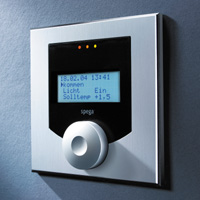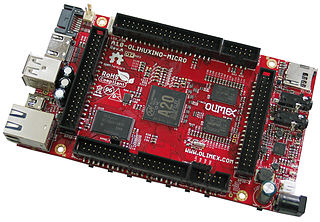Related Research Articles

Home automation or domotics is building automation for a home. A home automation system will monitor and/or control home attributes such as lighting, climate, entertainment systems, and appliances. It may also include home security such as access control and alarm systems.

A single-board computer (SBC) is a complete computer built on a single circuit board, with microprocessor(s), memory, input/output (I/O) and other features required of a functional computer. Single-board computers are commonly made as demonstration or development systems, for educational systems, or for use as embedded computer controllers. Many types of home computers or portable computers integrate all their functions onto a single printed circuit board.

Embedded software is computer software, written to control machines or devices that are not typically thought of as computers, commonly known as embedded systems. It is typically specialized for the particular hardware that it runs on and has time and memory constraints. This term is sometimes used interchangeably with firmware.
ProVerif is a software tool for automated reasoning about the security properties found in cryptographic protocols. The tool has been developed by Bruno Blanchet.
Ch is a proprietary cross-platform C and C++ interpreter and scripting language environment. It was originally designed by Harry H. Cheng as a scripting language for beginners to learn mathematics, computing, numerical analysis, and programming in C/C++. Ch is now developed and marketed by SoftIntegration, Inc., with multiple versions available, including a freely available student edition and Ch Professional Edition for Raspberry Pi is free for non-commercial use.

Raspberry Pi is a series of small single-board computers (SBCs) developed in the United Kingdom by the Raspberry Pi Foundation in association with Broadcom. The Raspberry Pi project originally leaned toward the promotion of teaching basic computer science in schools. The original model became more popular than anticipated, selling outside its target market for uses such as robotics. It is widely used in many areas, such as for weather monitoring, because of its low cost, modularity, and open design. It is typically used by computer and electronic hobbyists, due to its adoption of the HDMI and USB standards.

Eben Christopher Upton is the Welsh CEO of Raspberry Pi (Trading) Ltd., which runs the engineering and trading activities of the Raspberry Pi Foundation. He is responsible for the overall software and hardware architecture of the Raspberry Pi device. He is a former technical director and ASIC architect for Broadcom.

OLinuXino is an open hardware single-board computer capable of running Android or Linux designed by OLIMEX Ltd in Bulgaria.
Nanoprobing is method of extracting device electrical parameters through the use of nanoscale tungsten wires, used primarily in the semiconductor industry. The characterization of individual devices is instrumental to engineers and integrated circuit designers during initial product development and debug. It is commonly utilized in device failure analysis laboratories to aid with yield enhancement, quality and reliability issues and customer returns. Commercially available nanoprobing systems are integrated into either a vacuum-based scanning electron microscope (SEM) or atomic force microscope (AFM). Nanoprobing systems that are based on AFM technology are referred to as Atomic Force nanoProbers (AFP).

Banana Pi is a line of single-board computers produced by the Chinese company Shenzhen SINOVOIP Co., Ltd., its spin-off Guangdong BiPai Technology Co., Ltd. and supported by Hon Hai Technology (Foxconn).

Saraju Mohanty is an Indian-American professor of the Department of Computer Science and Engineering, and the director of the Smart Electronic Systems Laboratory, at the University of North Texas in Denton, Texas. Mohanty received a Glorious India Award – Rich and Famous NRIs of America in 2017 for his contributions to the discipline. Mohanty is a researcher in the areas of "smart electronics for smart cities/villages", "smart healthcare", "application-Specific things for efficient edge computing", and "methodologies for digital and mixed-signal hardware". He has made significant research contributions to security by design (SbD) for electronic systems, hardware-assisted security (HAS) and protection, high-level synthesis of digital signal processing (DSP) hardware, and mixed-signal integrated circuit computer-aided design and electronic design automation. Mohanty has been the editor-in-chief (EiC) of the IEEE Consumer Electronics Magazine during 2016-2021. He has held the Chair of the IEEE Computer Society's Technical Committee on Very Large Scale Integration during 2014-2018. He holds 4 US patents in the areas of his research, and has published 450 research articles and 5 books.
Fog computing or fog networking, also known as fogging, is an architecture that uses edge devices to carry out a substantial amount of computation, storage, and communication locally and routed over the Internet backbone.

Bashir Mohammed Ali Al-Hashimi, CBE, FRS, FREng, FIEEE, FIET, FBCS is a recognised multidisciplinary global researcher with sustained and pioneering contributions to computer engineering and a prominent academic and higher education leader. He is Vice President and ARM Professor of Computer Engineering at King's College London in the United Kingdom. He was the co-founder and co-director of the ARM-ECS Research Centre, an industry-university collaboration partnership involving the University of Southampton and ARM. He is actively involved in promoting science and engineering for young people and regularly contributes to engineering higher education and skills national debates.

Steam Link is a hardware and software product developed by Valve Corporation for streaming Steam content from a personal computer or Steam Machine wirelessly to a mobile device or other monitor. Steam Link was originally released as a hardware device alongside the debut of Steam Machines in November 2015. Valve discontinued the Steam Link hardware device in November 2018, in favor of supporting its software-based Steam Link application for mobile devices and smart televisions, as well as providing Steam Link as a software package for the Raspberry Pi microcomputer.
An AI accelerator is a class of specialized hardware accelerator or computer system designed to accelerate artificial intelligence and machine learning applications, including artificial neural networks and machine vision. Typical applications include algorithms for robotics, Internet of Things, and other data-intensive or sensor-driven tasks. They are often manycore designs and generally focus on low-precision arithmetic, novel dataflow architectures or in-memory computing capability. As of 2018, a typical AI integrated circuit chip contains billions of MOSFET transistors. A number of vendor-specific terms exist for devices in this category, and it is an emerging technology without a dominant design.
Pine Store Limited, known by its trade name Pine64, is a Hong Kong-based organization that designs, manufactures, and sells single-board computers, notebook computers, as well as smartwatch/smartphones. Its name was inspired by the mathematical constants pi and e with a reference to 64-bit computing power.

The ASUS Tinker Board is a single-board computer launched by ASUS in early 2017. Its physical size and GPIO pinout are designed to be compatible with the second and third-generation Raspberry Pi models. The first released board features 4K video, 2GB of onboard RAM, gigabit Ethernet and a Rockchip RK3288 processor running at 1.8 GHz.
Nano is a cryptocurrency characterized by a directed acyclic graph data structure and distributed ledger, making it possible for Nano to work without intermediaries. To agree on what transactions to commit, it uses a voting system with weight based on the amount of currency an account holds.

The Raspberry Pi 4 is the 4th generation of the mainline series of Raspberry Pi single-board computers. Developed by Raspberry Pi Trading and released on 24 June 2019, the Pi 4 came with many improvements over its predecessor; the SoC was upgraded to the Broadcom BCM2711, two of the Raspberry Pi's four USB ports were upgraded to USB 3.0, and options were added for RAM capacities larger than the 1 GB standard for the preceding Raspberry Pi 3 series. The Pi 4 also ends the trend of the $35 maximum MSRP that previous Raspberry Pis had adhered to, as the larger RAM capacities added extra cost to the board; however, the base 1 GB model is still sold for $35. On 28 September 2023, the Raspberry Pi 5 was announced as the successor to the Raspberry Pi 4.
References
- 1 2 3 "$30 NanoPi M1 Plus is Smaller Than a Raspberry Pi". PCMAG. Retrieved 2023-04-29.
- ↑ Tran, Duy; Manh Do, Ha; Sheng, Weihua; Bai, He; Chowdhary, Girish (2018). "Real‐time detection of distracted driving based on deep learning". IET Intelligent Transport Systems. 12 (10): 1210–1219. doi: 10.1049/iet-its.2018.5172 . ISSN 1751-9578. S2CID 115676885.
- ↑ Nathaniel Mott (2019-09-10). "Raspberry Pi 4 Competitor NanoPi M4 Gets Upgraded". Tom's Hardware. Retrieved 2023-04-29.
- 1 2 Les Pounder (2020-09-10). "NanoPi NEO3 Review: Raspberry Pi Competitor for Your Network". Tom's Hardware. Retrieved 2023-04-29.
- ↑ Heath, Nick (2019-04-05). "NanoPi NEO4 review: A powerful Raspberry Pi rival but with drawbacks". TechRepublic. Retrieved 2023-04-29.
- 1 2 Gu, Qijun; Jia, Chunrong (2019). "A Consumer UAV-based Air Quality Monitoring System for Smart Cities". 2019 IEEE International Conference on Consumer Electronics (ICCE). Las Vegas, NV, USA: IEEE. p. 4. doi:10.1109/ICCE.2019.8662050. ISBN 978-1-5386-7910-4. S2CID 71151289.
- ↑ Mark Tyson (2022-11-30). "Palm-Sized NanoPi R5C PC Starts at Just $49". Tom's Hardware. Retrieved 2023-04-29.
- ↑ Alderson, Alex (31 October 2022). "NanoPi R6S: New single-board computer launches with three Ethernet ports, HDMI 2.1, 8 GB RAM and a powerful processor". Notebookcheck. Retrieved 2023-04-29.
- ↑ Moreira, Erick Menezes; Oliveira, Jauvane Cavalcante de; Rosa, Paulo Fernando Ferreira (2019). "A Flying IoT Network to Help in Disaster Recovery". 2019 Latin American Robotics Symposium (LARS), 2019 Brazilian Symposium on Robotics (SBR) and 2019 Workshop on Robotics in Education (WRE). pp. 352–357. doi:10.1109/LARS-SBR-WRE48964.2019.00068. ISBN 978-1-7281-4268-5. S2CID 212635733.
This article needs additional or more specific categories .(April 2023) |